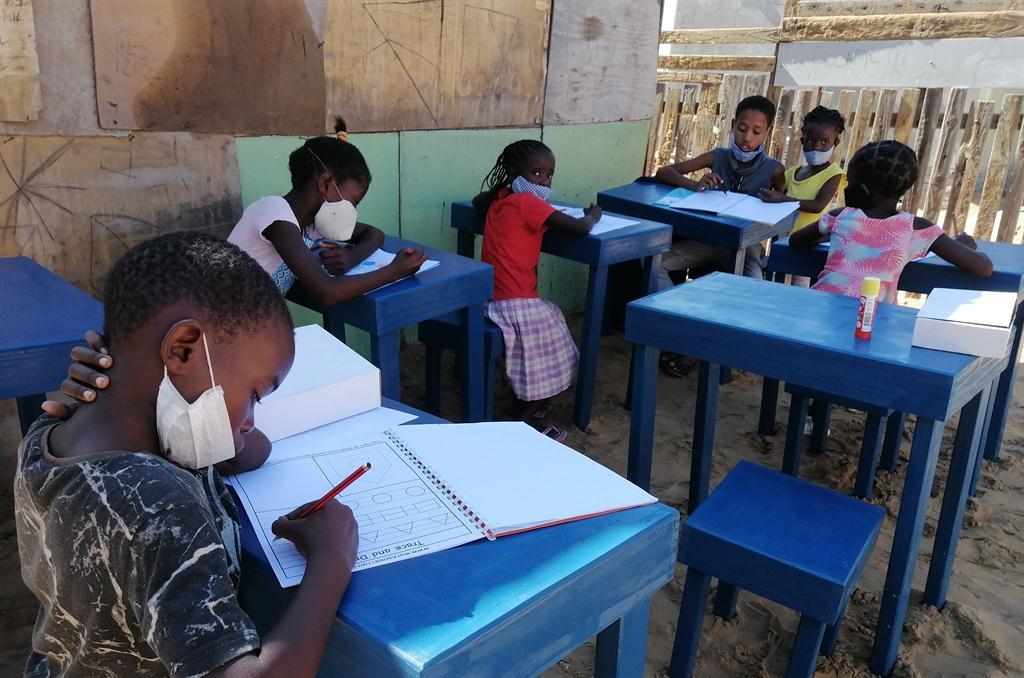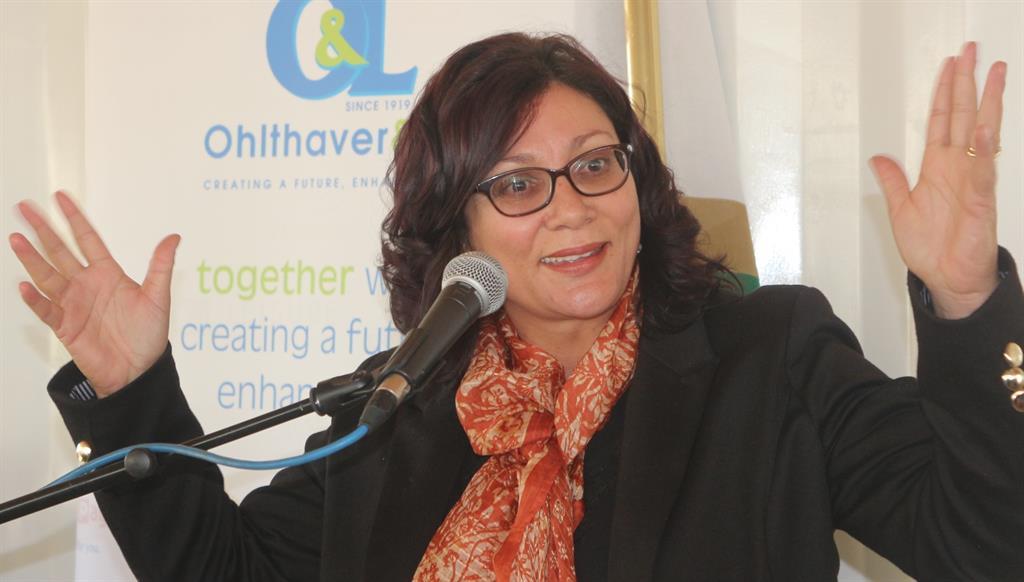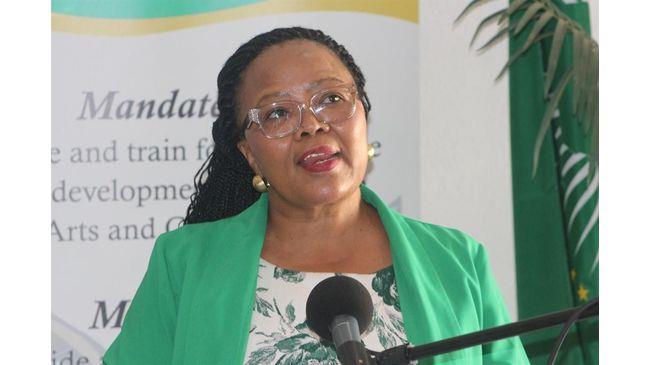Covid-19 pandemic reforms education
As the ministry ushers in a semester-based school calendar, they usher out all the certainties they previously had with the trimester-based calendar. However, the ministry remains optimistic about their new choice.
Iréne-Mari van der Walt
Amidst the looming uncertainty of the new semester calendar ushered in by the ministry of education, arts and culture, executive director Sanet Steenkamp says the ministry is not blind to the possibility of unforeseen circumstances that may affect learning.
“Though we are starting this with the best intentions, there might be unintended consequences,” says Steenkamp. She notes the 2020 rise in pregnancy among schoolgirls, as well as possible struggles in keeping children motivated and stimulated during the six-week holiday, the longest mid-year break Namibian learners have ever had, but insists that the ministry of education will remain on their toes and consistently investigate the positive and negative outcomes of the new calendar system.
“It is very important that we do research. We must do research on the impact of the extended semester, because it may feel long to learners, and then we also have to research the impact of the extended holidays with learners being at home for longer periods of time. We saw in the pandemic that there was an increased rate of pregnancy amongst learners with the constant closure of school and we need to keep looking into these factors,” she says.
Steenkamp makes mention of constant efforts by the ministry to provide regular refresher courses and comprehensive sex and sexuality education. However, she is adamant that the possibility of revisions is always on the table, should the stakeholders deem it right in the name of education.
“Especially now with Omicron, none of us know what to expect. There will be many new challenges and we will revisit the calendar if it is necessary,” she says.
Alongside the staggering teenage pregnancy statistics in the pandemic, Steenkamp is saddened by the lowering literacy and numeracy rates that have appeared in schools nationwide.
Understanding ministerial decision-making
She defines the new calendar, along with new undertakings by the ministry, as a “balancing act”. Steenkamp says that, despite the potentially impulsive appearance of decisions by the ministry, obtaining approval for any decision is a long and arduous process. The ministry must obtain approval from the majority of the 14 regions in Namibia through their regional offices who in turn liaise the proposed changes with individual schools.
Getting the go-ahead from the regional offices, however, is just the beginning of the long decision-making process within the ministry of education. Should a particular proposal earn the approval of the majority of the regional authorities, the unions and various other stakeholders that make up the national advisory council for education are approached with the proposal.
Should the aforementioned approve of the suggestion, the possible change is brought to the executive committee of the ministry of education, arts and culture after which, the proposal is brought to the newspapers in an attempt to garner public input. Should the ministry receive public commentary, this input will be brought back to the advisory council at which it will be balanced with the commentary of the advisory council.
From here, the executive committee can recommend the concept to the minister, who will then adopt or reject the proposal either with or without amendments.
At any level in this decision-making process, amendments can be suggested by stakeholders.
Long time coming
Steenkamp says the proposal of a semester-based calendar instead of a trimester-based calendar was initially the doing of the former minister of education, Katrina Hanse-Himarwa. However, in the time of Hanse-Himarwa, the proposal was thrown out after it did not garner the necessary regional support.
Now, in the Covid-19 pandemic, the regions have opted for Hanse-Himarwa’s proposal. The semester approach will keep learners at home during the cold winter months which are known to be a driver of Covid-19 infections.
Steenkamp vehemently dispels the notion that schools are drivers of Covid-19 in communities. “We know from the epidemiologists that schools are not major drivers of the spread of Covid-19 as it is community driven, but if the public feels this is best then we will respect that,” she says.
She notes that, like most other undertakings by the ministry, guardians play a pivotal role in the success of this venture. “This is a disruption for learners, even in the learning modes where students attend school on alternating days, they are disrupted so we need family members to guide and support our learners at home,” she says.
Steenkamp says that letting students stay home during the cold winter months has been a topic of debate for a long time.
“We have considered keeping students at home during the cold winter months for a long time and have adjusted school times because we are aware that many students walk long distances to school and have to walk in the dark, but now in the pandemic, it is a way of trying to control infection rates,” she says.
Testing still uncertain
Willemien Wannberg, the deputy director for curriculum development at the National Institute for Education Development, says none of the testing and feedback plans are set in stone at this time.
Currently, Wannberg reports that the testing and feedback system will include a report before the midterm break that is slated for May next year, as well as a mock exam for grades 9, 11 and 12. The possibility of the inclusion of grade 10 in the mock exam is being considered.
Wannberg believes that the new semester approach will not have a detrimental effect on testing. “We have midterm breaks to give them some rest and then a long holiday,” she says.
According to Wannberg, extracurricular activities like sport and cultural activities are to be determined by individual schools.
Learning support
Steenkamp proclaims herself a fierce fan of learning support. “People have this impression that it’s only students with learning problems that need learning support, but most of our students need learning support, and for that reason I very firmly believe that we should be offering as much learning support as we can,” she says.
She notes that despite the ministry’s best efforts in 2020 and 2021, there have been considerable losses in the education sector. “Aside from the dropout rates and increased learner pregnancies, we are noticing more and more learners fall through the cracks,” she says.
Education system forged by fire
Steenkamp says the learners who fall through the cracks have inspired a revolution in the way the Namibian ministry of education offers education. According to Steenkamp, the ministry has completed a phase of piloting the Jolly Phonics system in various regions. This in an attempt to address the wide and growing literacy and numeracy struggles amidst the pandemic.
The newly implemented Jolly Phonics programme recently raked in the award for best communication, language and literacy resource at the 2021 Teach Early Years awards.
However, the ministry does not only have the basics in mind as smart boards have been rolled out to schools countrywide. Smart boards allow teachers to project a computer image onto the board and interact with the projected image through the use of a special tool or their finger.
The snag in the smart board plan, however, is connectivity. Many schools, especially those in rural areas, have major struggles with network connectivity and even schools in urban areas do not always have internet connectivity in all classrooms.
Steenkamp expresses frustration at her lack of ability to solve this particular issue. “This unfortunately falls outside our jurisdiction, but we are trying to collaborate with telecommunication companies to get better connectivity in our schools,” she says.
The executive director remains adamant that the introduction of smart boards has had a huge impact on the results of students who had access to them as part of their learning.
Sponsors needed
However wonderfully the smart boards may be assisting teachers and learners in propelling education forward, the ministry still faces their long-time struggle – finances. An interactive whiteboard can cost from N$45 000 per unit, including licensing.
More than whiteboards, Steenkamp urges sponsors to collaborate with the Namibia Media Holdings education booklet project which she credits as a major help to reaching learners who may not have access to educational resources.
“NMH has been a huge help in educating our learners during this time and I would like to urge sponsors to get on board because we are looking forward to working with them again,” she says.
Amidst the looming uncertainty of the new semester calendar ushered in by the ministry of education, arts and culture, executive director Sanet Steenkamp says the ministry is not blind to the possibility of unforeseen circumstances that may affect learning.
“Though we are starting this with the best intentions, there might be unintended consequences,” says Steenkamp. She notes the 2020 rise in pregnancy among schoolgirls, as well as possible struggles in keeping children motivated and stimulated during the six-week holiday, the longest mid-year break Namibian learners have ever had, but insists that the ministry of education will remain on their toes and consistently investigate the positive and negative outcomes of the new calendar system.
“It is very important that we do research. We must do research on the impact of the extended semester, because it may feel long to learners, and then we also have to research the impact of the extended holidays with learners being at home for longer periods of time. We saw in the pandemic that there was an increased rate of pregnancy amongst learners with the constant closure of school and we need to keep looking into these factors,” she says.
Steenkamp makes mention of constant efforts by the ministry to provide regular refresher courses and comprehensive sex and sexuality education. However, she is adamant that the possibility of revisions is always on the table, should the stakeholders deem it right in the name of education.
“Especially now with Omicron, none of us know what to expect. There will be many new challenges and we will revisit the calendar if it is necessary,” she says.
Alongside the staggering teenage pregnancy statistics in the pandemic, Steenkamp is saddened by the lowering literacy and numeracy rates that have appeared in schools nationwide.
Understanding ministerial decision-making
She defines the new calendar, along with new undertakings by the ministry, as a “balancing act”. Steenkamp says that, despite the potentially impulsive appearance of decisions by the ministry, obtaining approval for any decision is a long and arduous process. The ministry must obtain approval from the majority of the 14 regions in Namibia through their regional offices who in turn liaise the proposed changes with individual schools.
Getting the go-ahead from the regional offices, however, is just the beginning of the long decision-making process within the ministry of education. Should a particular proposal earn the approval of the majority of the regional authorities, the unions and various other stakeholders that make up the national advisory council for education are approached with the proposal.
Should the aforementioned approve of the suggestion, the possible change is brought to the executive committee of the ministry of education, arts and culture after which, the proposal is brought to the newspapers in an attempt to garner public input. Should the ministry receive public commentary, this input will be brought back to the advisory council at which it will be balanced with the commentary of the advisory council.
From here, the executive committee can recommend the concept to the minister, who will then adopt or reject the proposal either with or without amendments.
At any level in this decision-making process, amendments can be suggested by stakeholders.
Long time coming
Steenkamp says the proposal of a semester-based calendar instead of a trimester-based calendar was initially the doing of the former minister of education, Katrina Hanse-Himarwa. However, in the time of Hanse-Himarwa, the proposal was thrown out after it did not garner the necessary regional support.
Now, in the Covid-19 pandemic, the regions have opted for Hanse-Himarwa’s proposal. The semester approach will keep learners at home during the cold winter months which are known to be a driver of Covid-19 infections.
Steenkamp vehemently dispels the notion that schools are drivers of Covid-19 in communities. “We know from the epidemiologists that schools are not major drivers of the spread of Covid-19 as it is community driven, but if the public feels this is best then we will respect that,” she says.
She notes that, like most other undertakings by the ministry, guardians play a pivotal role in the success of this venture. “This is a disruption for learners, even in the learning modes where students attend school on alternating days, they are disrupted so we need family members to guide and support our learners at home,” she says.
Steenkamp says that letting students stay home during the cold winter months has been a topic of debate for a long time.
“We have considered keeping students at home during the cold winter months for a long time and have adjusted school times because we are aware that many students walk long distances to school and have to walk in the dark, but now in the pandemic, it is a way of trying to control infection rates,” she says.
Testing still uncertain
Willemien Wannberg, the deputy director for curriculum development at the National Institute for Education Development, says none of the testing and feedback plans are set in stone at this time.
Currently, Wannberg reports that the testing and feedback system will include a report before the midterm break that is slated for May next year, as well as a mock exam for grades 9, 11 and 12. The possibility of the inclusion of grade 10 in the mock exam is being considered.
Wannberg believes that the new semester approach will not have a detrimental effect on testing. “We have midterm breaks to give them some rest and then a long holiday,” she says.
According to Wannberg, extracurricular activities like sport and cultural activities are to be determined by individual schools.
Learning support
Steenkamp proclaims herself a fierce fan of learning support. “People have this impression that it’s only students with learning problems that need learning support, but most of our students need learning support, and for that reason I very firmly believe that we should be offering as much learning support as we can,” she says.
She notes that despite the ministry’s best efforts in 2020 and 2021, there have been considerable losses in the education sector. “Aside from the dropout rates and increased learner pregnancies, we are noticing more and more learners fall through the cracks,” she says.
Education system forged by fire
Steenkamp says the learners who fall through the cracks have inspired a revolution in the way the Namibian ministry of education offers education. According to Steenkamp, the ministry has completed a phase of piloting the Jolly Phonics system in various regions. This in an attempt to address the wide and growing literacy and numeracy struggles amidst the pandemic.
The newly implemented Jolly Phonics programme recently raked in the award for best communication, language and literacy resource at the 2021 Teach Early Years awards.
However, the ministry does not only have the basics in mind as smart boards have been rolled out to schools countrywide. Smart boards allow teachers to project a computer image onto the board and interact with the projected image through the use of a special tool or their finger.
The snag in the smart board plan, however, is connectivity. Many schools, especially those in rural areas, have major struggles with network connectivity and even schools in urban areas do not always have internet connectivity in all classrooms.
Steenkamp expresses frustration at her lack of ability to solve this particular issue. “This unfortunately falls outside our jurisdiction, but we are trying to collaborate with telecommunication companies to get better connectivity in our schools,” she says.
The executive director remains adamant that the introduction of smart boards has had a huge impact on the results of students who had access to them as part of their learning.
Sponsors needed
However wonderfully the smart boards may be assisting teachers and learners in propelling education forward, the ministry still faces their long-time struggle – finances. An interactive whiteboard can cost from N$45 000 per unit, including licensing.
More than whiteboards, Steenkamp urges sponsors to collaborate with the Namibia Media Holdings education booklet project which she credits as a major help to reaching learners who may not have access to educational resources.
“NMH has been a huge help in educating our learners during this time and I would like to urge sponsors to get on board because we are looking forward to working with them again,” she says.






Comments
Namibian Sun
No comments have been left on this article